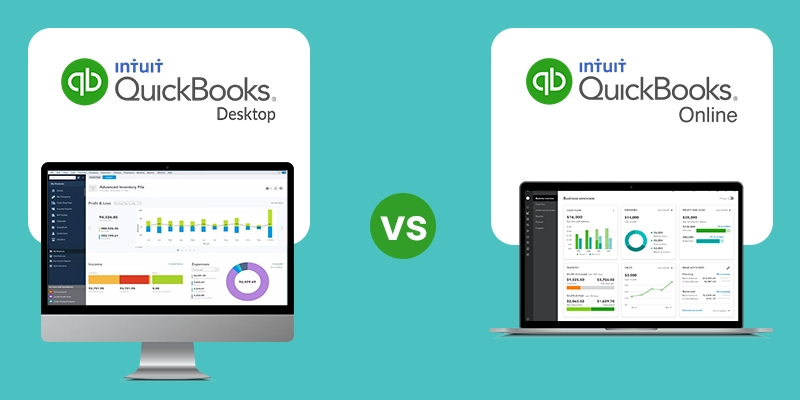
QuickBooks Online vs Desktop 2025: What is the Key Differences?
QuickBooks has become a household name in the world of accounting software. With two main versions available, QuickBooks Online vs Desktop, it’s important to understand the differences between them to make an informed decision for your business. In this blog post, we will explore the key differences between the two programs, including QuickBooks Online vs Desktop pros and cons, so that you can decide which one to use for your business.
QuickBooks Online vs Desktop Pros and Cons: Deciding Factors
| Pricing & Features | QuickBooks Online | QuickBooks Desktop |
| Pricing | Simple Start: $30 per monthEssentials: $55 per month
Plus: $85 per month Advanced: $200 per month |
Pro: From $549.99 per year for one user
Premier: From $799 per year for one user Enterprise: From $1,410 per year for one user |
| Number of Users Supported | Simple Start: 1 user
Essentials: 3 users Plus: 5 users Advanced: 25 users |
Pro: 3 users
Premier: 5 users Enterprise: 40 users |
| Free Trial | 30 Days | N/A |
| Money-back Guarantee | N/A | 60 days from the purchase date |
| Accessibility | Cloud | Desktop |
| Better For | Businesses that often perform accounting tasks remotely | Companies that prefer locally installed software |
| Invoicing | ✓ | ✓ |
| Income and Expense Tracking | ✓ | ✓ |
| Bank Reconciliation | ✓ | ✓ |
| FIFO Inventory | ✓ | ✓ |
| Reporting | ✓ | ✓ |
| Automatic Calculation of Sales Taxes based on Customer’s Address | ✓ | X |
| Industry-specific Editions | X | ✓ |
| Inventory Assembly | X | ✓ |
| Multi-company Support (No Additional Cost) | X | ✓ |
| Ability to Set up Advanced Pricing Rules | X | QuickBooks Enterprise |
| Mobile App | Excellent | Limited |
QuickBooks Online vs Desktop: Which Suits You the Best
Below we discuss in greater detail the key differences between QuickBooks Desktop vs Online:
1. Accessibility
One of the main differences between QuickBooks Online vs Desktop is their accessibility. QuickBooks Online is a cloud-based software that can be accessed anywhere using any internet-enabled device. QuickBooks Desktop, on the other hand, must be installed on a laptop or computer where you plan to use it.
This difference makes QuickBooks Online more suitable for businesses with remote teams or those who need to access their financial data on the go. Meanwhile, business owners that have limited internet connection or those that prefer the speed and functionality of desktop software prefer QuickBooks Desktop vs Online.
2. Feature Set
QuickBooks Online vs desktop offer similar core accounting features, such as income and expense tracking, invoicing, and reporting. However, there is a notable advantage of QuickBooks Desktop vs Online, as it offers a more extensive set of features, including advanced inventory management, free multi-company support, and job costing.
Many businesses consider QuickBooks Premier over QuickBooks Online because of its advanced inventory management features and the availability of industry-specific features. Medium-sized and large businesses upgrade to QuickBooks Enterprise to access enhanced inventory functionalities, like barcode scanning, serial number or lot tracking, bin location tracking, and multi-location inventory tracking.
In addition to industry-specific features, QuickBooks Desktop Premier and Enterprise have unique reports tailored to each industry. For instance, the QuickBooks Desktop Contractor Edition has unique reports, such as Job Profitability Summary and Job Profitability Detail to track costs and profitability on a per-job basis. These reports help in assessing project profitability, estimating future jobs, and identifying areas for cost optimization.
In contrast, QuickBooks Online focuses on providing a streamlined and user-friendly experience. While it may not offer the same breadth of features as QuickBooks Desktop, it compensates with regular updates and improvements. Updates in QuickBooks Online are automatic and seamless, ensuring users always have access to the latest enhancements without the need for manual installations or upgrades.
3. Pricing Structure
QuickBooks Online follows a subscription-based pricing model, with four plans available to choose from based on the needs of your business. The subscription fee includes software updates and access to customer support. This model is beneficial for businesses looking for flexibility and scalability as they can easily upgrade or downgrade their subscription as their needs change.
On the other hand, QuickBooks Desktop is available as an annual subscription option, which includes software updates and technical support. While the upfront cost of QuickBooks Desktop may be higher, it can be more cost-effective for businesses in the long run, especially if they do not require regular feature updates or cloud accessibility.
Unlock the Power of QuickBooks and Simplify your Accounting Tasks to Gain Financial Success
4. Simultaneous Users
QuickBooks Online plan comes with a set number of users included in your subscription, and all users can access the program at the same time. QuickBooks Desktop, on the other hand, can have multiple users set up, but only one user is allowed to access the program at a time unless you add extra users for an additional cost. While QuickBooks Desktop is affordable for a single user, we recommend QuickBooks Online over Desktop for multi-user environments.
5. Data Security and Backup
QuickBooks Online ensures data security through automatic backups and industry-standard encryption protocols. Since the data is stored in the cloud, there is minimal risk of data loss due to hardware failure or disasters. In contrast, QuickBooks Desktop relies on local data storage, making it susceptible to data loss in the event of system crashes or physical damage to the device. However, users can implement backup solutions to mitigate this risk.
6. File Sharing
There is a significant difference between QuickBooks Online vs Desktop in terms of sharing files with accountants. QuickBooks Online has the advantage due to its cloud-based nature. You simply need to send an email invitation to grant your accountants or bookkeepers access to your company file, allowing them to collaborate with you in real time. Your accountant can log in to the QuickBooks Online platform using their own credentials, eliminating the need for file transfers or physical handoffs.
Meanwhile, QuickBooks Desktop relies on the Accountant’s Copy feature to facilitate file sharing with accountants. With the Accountant’s Copy, you need to create a copy of the company file specifically for the accountant to work on.
The accountant can make changes and adjustments to the Accountant’s Copy while you continue working on the original file. Once the accountant completes their work, the changes can be imported back into the original file. While this feature allows for some level of collaboration, it requires the file to be split into two separate copies and imposes limitations on certain functionalities until the accountant’s changes are imported.
7. Mobile App
QuickBooks Online offers a robust mobile app that allows you to perform a wide range of bookkeeping tasks directly from your smartphones or tablets. The app allows you to create and send invoices, enter bills, accept payments, and view reports. Meanwhile, the QuickBooks Desktop app is very limited as it primarily serves as a tool for capturing and attaching receipts to transactions. It allows you to take photos of receipts and directly upload them to your QuickBooks Desktop software for record-keeping purposes. Later, if needed, you can conveniently edit photos free using your mobile device for any necessary adjustments.
Also learn: How to Manage the Bills in QuickBooks Online
8. Integration and Third-Party Apps
Both QuickBooks Online vs Desktop offer integration capabilities and support for third-party apps, but there are differences in the extent of integration options available. QuickBooks Online has a wider range of integrations with popular business tools, including CRM systems, project management software, and e-commerce platforms.
QuickBooks Desktop also supports integration with select third-party applications but has a more limited range compared to QuickBooks Online. However, it offers more control and customization options for businesses that require specific integrations.
QuickBooks Online vs Desktop Reviews and Ratings
Image source: Business.org
Overall Average Reviews and ratings of QuickBooks Online on the basis of popular review websites are 4.2 out of 5 whereas QuickBooks Desktop ratings are 4.5 out of 5. Reviews by real users were on the basis of value for money, ease of use, customer support, features and functionality.
| Review Websites | QuickBooks Online | QuickBooks Desktop |
| Software Advice | 4.33 ratings out of 5 on the basis of around 6,222 reviews. | 4.5 ratings out of 5 on the basis of 19,947 reviews. |
| GetApp | 4.3 ratings out of 5 on the basis of 6,227 reviews. | 4.5 ratings out of 5 on the basis of 19,960 Reviews. |
| G2 | 4 ratings out of 5 on the basis of 3,105 reviews . | 4.2 ratings out of 5 on the basis of 798 reviews. |
| TrustRadius | 7.8 ratings out of 10 on the basis of 1,560 reviews. | 7.9 ratings out of 10 on the basis of 681 reviews. |
| Capterra | 4.3 ratings out of 5, on the basis of 6,227 reviews. | 4.5 ratings out of 5, on the basis of 19,962 reviews. |
Bottom Line
Both QuickBooks Online and QuickBooks Desktop offer robust accounting solutions for businesses, but they differ in key aspects that can significantly impact your decision. QuickBooks Online provides the advantage of accessibility, allowing you to manage your finances from anywhere with an internet connection. QuickBooks Desktop shines in terms of advanced functionality like inventory management and industry-specific features.
Frequently Asked Questions (FAQs)
Is QuickBooks Desktop being phased out?
No, QuickBooks Desktop is still available. In fact, the QuickBooks Desktop 2023 has been released with some new features like automatic mileage tracking, a Cash Flow Hub, and custom payment links to simplify payment collection from customers. However, Intuit has decided to discontinue all the QuickBooks Desktop 2020 versions including: QuickBooks Desktop Pro 2020, QuickBooks Desktop Premier 2020, QuickBooks Enterprise 2020, and QuickBooks Desktop for Mac 2020 after May 31, 2023.
Note: Other QuickBooks Desktop versions will not be affected; instead you can choose to upgrade QuickBooks to its latest release.
What is the key difference between QuickBooks Online vs QuickBooks Desktop?
QuickBooks Online and QuickBooks Desktop are two completely different software programs. QuickBooks Online is cloud-based software, while QuickBooks Desktop is locally installed.
Why do some companies choose QuickBooks Desktop over Online?
QuickBooks Desktop has enhanced accounting features not found in QuickBooks Online, including industry-specific editions and reports, the ability to add and manage unlimited companies at no cost, inventory assembly management, and advanced pricing rules.
 written by
written byAbout Author







